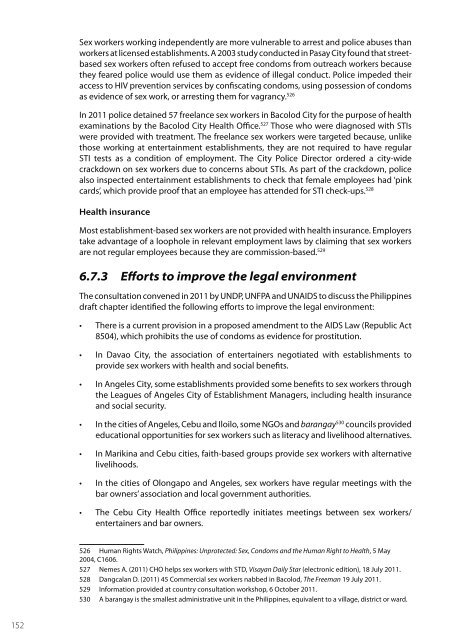SEX WORK AND THE LAW - HIV/AIDS Data Hub
SEX WORK AND THE LAW - HIV/AIDS Data Hub
SEX WORK AND THE LAW - HIV/AIDS Data Hub
Create successful ePaper yourself
Turn your PDF publications into a flip-book with our unique Google optimized e-Paper software.
Sex workers working independently are more vulnerable to arrest and police abuses than<br />
workers at licensed establishments. A 2003 study conducted in Pasay City found that streetbased<br />
sex workers often refused to accept free condoms from outreach workers because<br />
they feared police would use them as evidence of illegal conduct. Police impeded their<br />
access to <strong>HIV</strong> prevention services by confiscating condoms, using possession of condoms<br />
as evidence of sex work, or arresting them for vagrancy. 526<br />
In 2011 police detained 57 freelance sex workers in Bacolod City for the purpose of health<br />
examinations by the Bacolod City Health Office. 527 Those who were diagnosed with STIs<br />
were provided with treatment. The freelance sex workers were targeted because, unlike<br />
those working at entertainment establishments, they are not required to have regular<br />
STI tests as a condition of employment. The City Police Director ordered a city-wide<br />
crackdown on sex workers due to concerns about STIs. As part of the crackdown, police<br />
also inspected entertainment establishments to check that female employees had ‘pink<br />
cards’, which provide proof that an employee has attended for STI check-ups. 528<br />
Health insurance<br />
Most establishment-based sex workers are not provided with health insurance. Employers<br />
take advantage of a loophole in relevant employment laws by claiming that sex workers<br />
are not regular employees because they are commission-based. 529<br />
6.7.3 Efforts to improve the legal environment<br />
The consultation convened in 2011 by UNDP, UNFPA and UN<strong>AIDS</strong> to discuss the Philippines<br />
draft chapter identified the following efforts to improve the legal environment:<br />
<br />
<br />
<br />
<br />
<br />
<br />
<br />
There is a current provision in a proposed amendment to the <strong>AIDS</strong> Law (Republic Act<br />
8504), which prohibits the use of condoms as evidence for prostitution.<br />
In Davao City, the association of entertainers negotiated with establishments to<br />
provide sex workers with health and social benefits.<br />
In Angeles City, some establishments provided some benefits to sex workers through<br />
the Leagues of Angeles City of Establishment Managers, including health insurance<br />
and social security.<br />
In the cities of Angeles, Cebu and Iloilo, some NGOs and barangay 530 councils provided<br />
educational opportunities for sex workers such as literacy and livelihood alternatives.<br />
In Marikina and Cebu cities, faith-based groups provide sex workers with alternative<br />
livelihoods.<br />
In the cities of Olongapo and Angeles, sex workers have regular meetings with the<br />
bar owners’ association and local government authorities.<br />
The Cebu City Health Office reportedly initiates meetings between sex workers/<br />
entertainers and bar owners.<br />
526 Human Rights Watch, Philippines: Unprotected: Sex, Condoms and the Human Right to Health, 5 May<br />
2004, C1606.<br />
527 Nemes A. (2011) CHO helps sex workers with STD, Visayan Daily Star (electronic edition), 18 July 2011.<br />
528 Dangcalan D. (2011) 45 Commercial sex workers nabbed in Bacolod, The Freeman 19 July 2011.<br />
529 Information provided at country consultation workshop, 6 October 2011.<br />
530 A barangay is the smallest administrative unit in the Philippines, equivalent to a village, district or ward.<br />
152
















